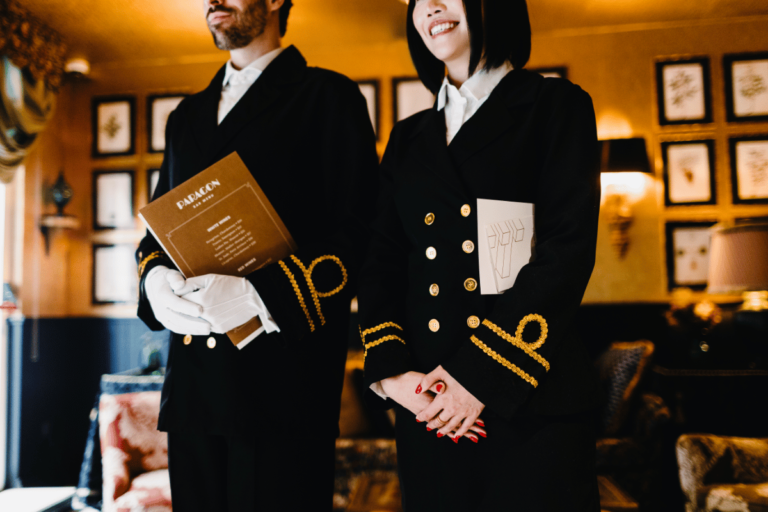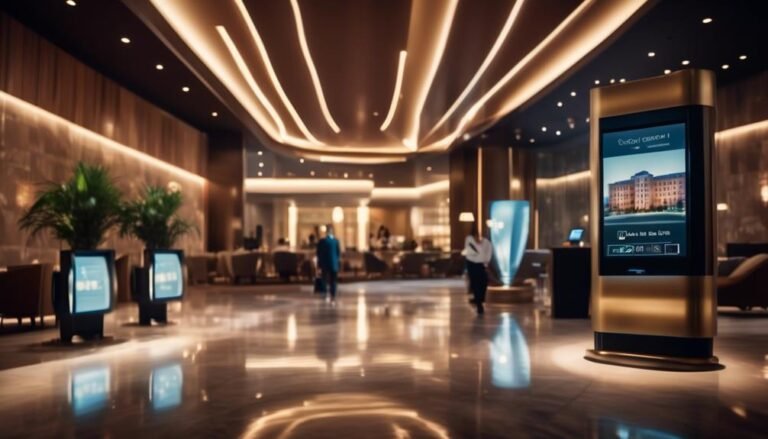Developing Leadership Qualities in Hotel Management
Effective leadership in the hotel management industry is not merely about supervising operations; it requires a blend of strategic vision, emotional intelligence, and the ability to inspire and guide a diverse team.
The hospitality sector is dynamic and demanding, making the development of leadership qualities a crucial aspect of success. From fostering a positive organizational culture to making sound decisions in high-pressure situations, the role of a leader in hotel management is multifaceted.
In this discussion, we will explore key attributes and skills that are essential for aspiring hotel managers to cultivate, and how these qualities can significantly impact the success of a hotel and its team.
Key Takeaways
- Effective leaders in hotel management exhibit various leadership styles such as transformational, democratic, and servant leadership.
- Communication and interpersonal skills are crucial for leaders in hotel management, including active listening and conflict resolution.
- Quick decision-making and problem-solving skills are essential for resolving operational issues and maintaining high guest satisfaction.
- Motivating and inspiring teams, as well as fostering a positive work culture, are important for increasing productivity and employee satisfaction.
Understanding the Role of a Leader
Understanding the role of a leader in hotel management is essential for creating a cohesive and efficient work environment. Leadership qualities play a pivotal role in guiding a team towards achieving common goals. Effective leaders in hotel management exhibit various leadership styles, including transformational, democratic, and servant leadership. They possess strong communication skills, empathy, and the ability to inspire and motivate their team members. A leader’s capacity to adapt their leadership style to different situations and individuals is crucial in the dynamic hospitality industry.
Leadership qualities such as integrity, resilience, and the ability to make tough decisions are particularly important in hotel management, where unforeseen challenges are common. A leader must also foster a positive work culture, encourage teamwork, and prioritize staff development and well-being. In the hospitality sector, where customer satisfaction is paramount, leaders must instill a customer-centric approach in their teams.
Communication and Interpersonal Skills
In the context of hotel management, effective leadership qualities extend to encompass a strong emphasis on communication and interpersonal skills. As a leader in the hospitality industry, one must be adept at active listening, understanding the needs and concerns of both guests and staff. This skill is essential for fostering positive relationships and creating a welcoming environment for everyone. Moreover, conflict resolution is another vital aspect of communication and interpersonal skills. Leaders should be capable of addressing and resolving conflicts in a professional and timely manner to ensure the smooth operation of the hotel.
To illustrate, here is a table highlighting the importance of these skills:
| Communication and Interpersonal Skills | Description |
|---|---|
| Active Listening | The ability to fully concentrate, understand, respond, and remember what is being said. |
| Conflict Resolution | The skill of addressing and resolving disagreements or disputes among individuals or groups. |
Mastering these skills is paramount for effective leadership in hotel management, as they directly contribute to guest satisfaction, employee morale, and overall operational efficiency.
Decision-Making and Problem-Solving
Effective leadership in hotel management requires the ability to make quick decisions and solve problems efficiently. By honing quick decision-making skills and effective problem-solving techniques, hotel managers can navigate the complexities of the hospitality industry with confidence and agility.
These qualities are essential for ensuring smooth operations, guest satisfaction, and overall success in the hotel business.
Quick Decision-Making Skills
A critical aspect of effective hotel management is the ability to make quick and well-informed decisions in response to various operational challenges and guest needs.
Improving efficiency and enhancing productivity are essential elements of quick decision-making skills in hotel management. Quick decision-making allows hotel managers to respond promptly to guest requests, resolve operational issues, and capitalize on business opportunities.
By making swift and informed decisions, managers can prevent bottlenecks in service delivery, optimize resource allocation, and maintain high standards of guest satisfaction.
Additionally, quick decision-making skills contribute to a dynamic and agile work environment, enabling the hotel to adapt swiftly to changing market conditions and guest preferences.
Effective Problem-Solving Techniques
Utilizing astute problem-solving techniques is imperative for hotel managers to navigate complex operational challenges and ensure seamless guest experiences.
Collaborative brainstorming sessions involving key team members can foster an environment where diverse perspectives are considered, leading to more comprehensive problem analysis. This approach encourages innovative solutions to emerge as a result of pooling together the collective expertise and creativity of the team.
In the context of hotel management, this can be particularly effective when addressing issues such as guest satisfaction, operational efficiency, and service quality. By leveraging collaborative brainstorming, hotel managers can tap into a wealth of ideas and perspectives, enabling them to identify and implement innovative solutions that may not have been apparent through individual problem-solving efforts alone.
This not only enhances decision-making but also cultivates a culture of teamwork and collective problem-solving within the hotel management team.
Motivating and Inspiring Teams
Motivating and inspiring teams involves fostering a work environment that encourages enthusiasm, dedication, and a sense of purpose among employees. To achieve this, hotel managers can employ various strategies that evoke an emotional response in the audience:
- Team Empowerment and Morale Boosting:
- Encourage open communication and active participation in decision-making processes. This creates a sense of ownership and responsibility, boosting morale and fostering a collaborative environment.
- Recognize and celebrate individual and team accomplishments. Acknowledging hard work and dedication instills a sense of pride and motivates employees to excel further.
Inspirational leadership and team motivation are pivotal in creating an environment where employees feel valued and motivated to perform at their best. By implementing these strategies, hotel managers can cultivate a positive and uplifting work culture, leading to increased productivity and higher employee satisfaction.
Adaptability and Change Management
Amidst the dynamic nature of the hospitality industry, adept hotel managers adeptly navigate change and foster adaptability within their teams to ensure continued success and operational efficiency. Change management is a fundamental aspect of hotel management as the industry constantly evolves in response to consumer trends, technological advancements, and global events.
Flexibility is crucial for hotel managers and their teams to effectively respond to these changes, adapt operations, and meet the evolving needs of guests. This flexibility encompasses the ability to swiftly adjust strategies, processes, and services without compromising quality.
Moreover, resilience is essential in change management within the hotel industry. Managers must lead by example, demonstrating resilience in the face of adversity and uncertainty. This resilience can be instilled in teams through effective communication, support, and a positive work culture. Engaging in open dialogue about change, its implications, and the strategies to navigate it can help alleviate concerns and resistance within the team.
Building a Positive Organizational Culture
Creating a positive organizational culture is essential for fostering employee engagement and enhancing overall productivity within the hotel management setting. A positive culture not only promotes a sense of belonging and loyalty among employees but also encourages them to be more invested in their work, leading to improved customer satisfaction and increased profitability.
To achieve this, hotel managers should prioritize the following:
- Open Communication: Establishing transparent and open lines of communication within the organization fosters trust and encourages employees to freely express their ideas and concerns. This helps in creating a supportive and inclusive work environment.
- Encouraging feedback and suggestions from employees
- Holding regular team meetings to discuss goals, challenges, and successes
- Recognition and Appreciation: Acknowledging and appreciating employees’ hard work and contributions not only boosts morale but also motivates them to go above and beyond in their roles.
- Implementing an employee recognition program
- Celebrating individual and team achievements
Continuous Learning and Development
To cultivate a culture of continuous learning and development within a hotel management setting, it is imperative to prioritize ongoing professional growth and skill enhancement for the staff. This includes providing access to leadership workshops, industry conferences, and specialized training programs. By investing in these opportunities, hotel management can ensure that its employees stay updated with the latest industry trends and best practices, thereby contributing to the overall success of the establishment.
| Professional Growth | Leadership Workshops |
|---|---|
| Encouraging higher education | Enhancing communication skills |
| Cross-training opportunities | Effective decision-making strategies |
| Mentoring programs | Team building and conflict resolution |
| Professional certifications | Strategic planning and innovation |
Conclusion
In the world of hotel management, developing leadership qualities is like tending to a garden. It requires constant attention, nurturing, and cultivation.
Effective leaders understand their role, communicate effectively, make decisions and solve problems, motivate and inspire their teams, adapt to change, and foster a positive organizational culture.
Continuous learning and development are essential for growth and success in this dynamic industry. Just as a gardener tends to their garden, leaders must tend to their leadership qualities to see them flourish.







